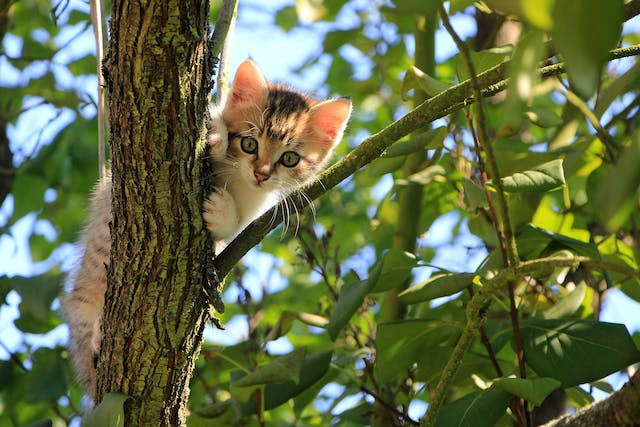Have you been noticing a Change in your cat’s weight? well weight gain is common with cats especially as they get older because their metabolism slows down. In fact, cat obesity is common in our country and almost 50% of cats are overweight. It’s important to recognize when your fluffy is getting chubby as excess weight can cause and lead to more health problems.
Is my kitty overweight?
The most common method of telling if your kitty is overweight is by feeling along the rib cage. A healthy cat, the paddling should not feel any thicker than the paddling over the back of your hand, if you press firmly for you to feel the ribs then your cat might be overweight, if you press firmly and you can’t feel the ribs at all then your cat may actually be obese.
Another way is by presenting your kitty to a veterinarian. The vet will weigh the cat and examine the overall body condition of the cat.
Impacts of excess weight to your cat
Overweight has a psychological effect on human and there is no difference even in cats. Humans spend some time looking at the mirror wishing they could look better in a swim suit, but cats can’t do that hence overweight cats might refrain from engaging in normal daily cat routine activities like personal hygiene and play. Your kitty might feel depressed or anxious. A study in The Journey of Veterinary Behavior concludes that cats and dogs can at times overreact to combat stress or negative feelings.
Overweight cats are more prone to diseases such as arthritis, diabetes and chronic inflammation a condition that impacts negatively on the overall health of our pets.
What cause your cat to gain weight?
As a veterinarian the most common cause of cat weight gain, I have encountered are overfeeding and your fluffy having less or no exercises. This happens mostly without fur parents realizing it, especially as the cat gets older the metabolism slows down as well as the activity levels. The nutritional needs for an older cat and a younger cat are different, therefore when you continue to feed your cat with the same amount and type of food you interfere with the nutritional needs of your kitty at a certain age. It’s always a good idea to have your cats weight checked regularly by your vet.
Neutered cats are at a higher risk of becoming overweight. Indoor cats are also at risk of becoming overweight especially if they are less active. Cats that are allowed to free -choice-feed/ graze on a bowl of pellets or any other cat food throughout the day are more likely to be overweight.
Help your cat lose weight
Recognizing your kitty is overweight is only a step further to helping your kitty lose some weight.
Here are some steps you can take to help your cat have a healthy weight.
1.Avail your cat to the veterinarian
The veterinarian will diagnose your cat and rule out any underlying health issues that could be causing weight gain. Your veterinarian will guide you on a healthy meal plan and guidelines on a healthy weight for a cat.
2.Monitor and control your cat’s feed intake
A drastic reduction of the amount of food you give your overweight cat is actually dangerous and can cause liver disease and expose your cat to stress due to starvation. It’s safer to reduce your cat’s food gradually by feeding the cat a nutritious meal that will be provided by your vet (weight control cat food).
3.Increase on the activity levels of your cat
The amount of exercise varies with the breed and age of the cat. According to Cat Behavior Associates cats require two fifteen minutes sessions per day of play ie use of interactive play toys. You can also introduce an indoor or outdoor cat tree as its good for the cat to jump and climb hence acts as a cat gym.
In conclusion, the prevalence of overweight and obesity among cats is a growing concern that demands our attention and proactive measures. As feline companionship continues to rise, so does the risk of health issues associated with excess weight. The consequences of cat overweight extend beyond physical appearance, impacting their overall well-being and longevity.
Addressing this issue requires a multi-faceted approach, involving responsible pet ownership, mindful feeding habits, regular exercise, and veterinary guidance. Pet owners must be vigilant in monitoring their cat’s weight and be willing to make necessary adjustments to their lifestyle to ensure a healthy and fulfilling life for their feline friends.
Educational campaigns about feline nutrition and the dangers of obesity can play a crucial role in raising awareness and empowering cat owners to make informed choices. Additionally, collaboration between veterinarians and pet owners is essential to tailor individualized weight management plans that consider the cat’s age, breed, and health status.
By prioritizing our cats’ health and taking proactive steps to prevent and manage overweight conditions, we can contribute to a happier and healthier feline population. Through collective efforts, we can ensure that our beloved companions lead active, vibrant lives, free from the burden of excess weight and its associated health risks
What is the best and healthiest kitten food?


I am a cat person. I have a large very furry cat. I never thought its weight was a bother to it. Well, now I know better.👍